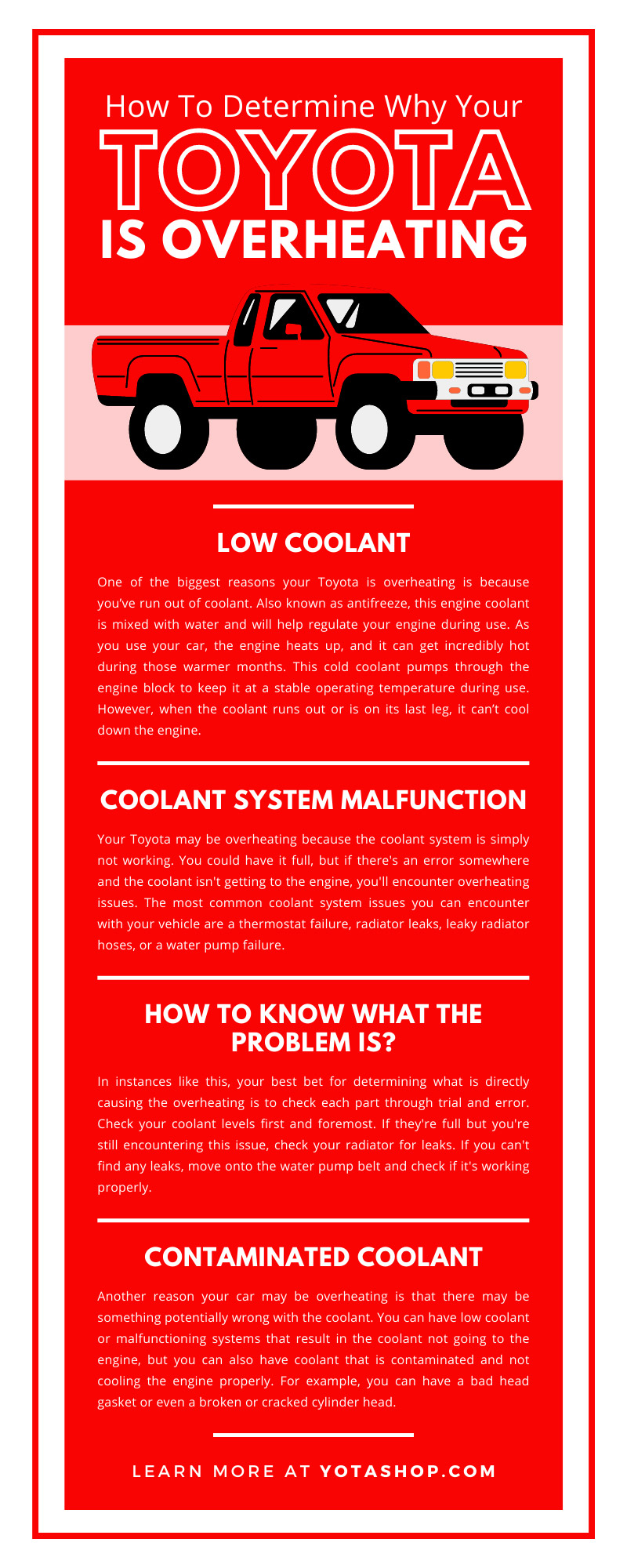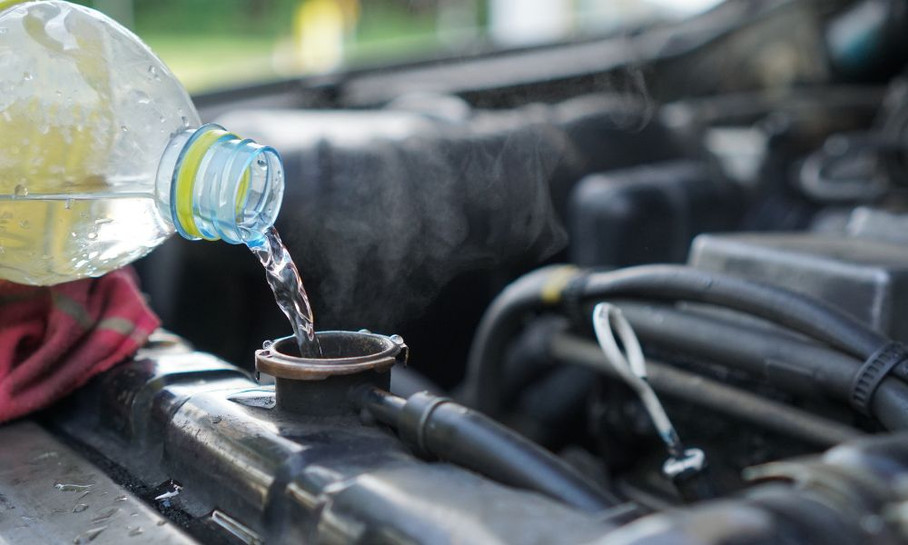No matter what kind of car you have, you will encounter issues like overheating at one point or another, even if your car is a Toyota. Different vehicles are complex machines with many moving parts, and all it takes is for one of those parts to be off to create some issues farther down the line. Read on to learn how to determine why your Toyota is overheating.
Low Coolant
One of the biggest reasons your Toyota is overheating is because you’ve run out of coolant. Also known as antifreeze, this engine coolant is mixed with water and will help regulate your engine during use. As you use your car, the engine heats up, and it can get incredibly hot during those warmer months. This cold coolant pumps through the engine block to keep it at a stable operating temperature during use. However, when the coolant runs out or is on its last leg, it can’t cool down the engine.
Without coolant to cool the engine down, it can quickly go to dangerous temperatures and start overheating. When the car starts smelling hot, you’ll hear a ticking or thumping sound, and a temperature light or gauge will turn on, warning you about the temperature. If you check under your hood and your coolant is low or empty, that may be the main reason the car is overheating.
Coolant System Malfunction
Like the last point, your Toyota may be overheating because the coolant system is simply not working. You could have it full, but if there's an error somewhere and the coolant isn't getting to the engine, you'll encounter overheating issues. The most common coolant system issues you can encounter with your vehicle are a thermostat failure, radiator leaks, leaky radiator hoses, or a water pump failure.
Be sure to check your coolant system belts to determine whether the issue is with the water pump. Regarding the radiator, you can have all kinds of leaks that stop the system from pumping properly. Leaks will drain your system of coolant, but before this happens, they won't be able to complete their cooling cycle, and overheating can occur in the meantime, making the leak worse. Rocks or other debris can get through the grill of your car and create leaks, but these leaks can also pop up from years of wear and tear.
In addition to the radiator and the water pump, you can also have issues with your thermostat regulating the engine's temperature. If your thermostat determines that the engine is getting hotter, it will open so the coolant can pump through and cool the engine down. However, if the thermostat is broken, it may not recognize that the engine is hot or may not even open up when it wants to. All these systems work closely together to ensure that the engine stays cool, but if one of them breaks, you will run into some overheating.
How To Know What the Problem Is?
In instances like this, your best bet for determining what is directly causing the overheating is to check each part through trial and error. Check your coolant levels first and foremost. If they're full but you're still encountering this issue, check your radiator for leaks. If you can't find any leaks, move onto the water pump belt and check if it's working properly. Lastly, you can check your thermostat and see if it's functioning as it should. Remember—these are also only issues with the coolant system. If they are not the cause, you may need to check additional systems that could be behind your Toyota overheating.
Contaminated Coolant
Another reason your car may be overheating is that there may be something potentially wrong with the coolant. You can have low coolant or malfunctioning systems that result in the coolant not going to the engine, but you can also have coolant that is contaminated and not cooling the engine properly. For example, you can have a bad head gasket or even a broken or cracked cylinder head.
This problematic equipment can lead to oil mixing with the coolant, which results in unwanted sludge. Sludge like this does not cool the engine, and instead, it messes up all your pipes and can even damage the radiator and thermostat. If your Toyota is automatic, you can get the coolant mixed with the transmission fluid. In automatic vehicles, the coolant also cools down the transmission, so any minute breach in a system can lead to contamination.
Contamination also doesn't solely come from other components in the car. You can contaminate coolant with too much water, minerals, or air. Any one of these can potentially make its way to your engine and cause a malfunction that results in overheating. Keep your coolant in a secure location so no potential contaminants can get in and hurt your Toyota.
Another contaminant that you must look out for, but one that is quite hard to see, is electrical charges. You have the coolant in your car, and while it's in there, all kinds of electrical currents can interfere. For example, if you got your battery, starter, or alternator replaced, you might need to replace the coolant since an electrical charge can easily transfer to it. This electrical charge can hurt your vehicle by corroding the water pump, causing leaks in the radiator, or corroding freeze plugs. This damage is dangerous in and of itself, but it will also lead to your engine overheating.
The Wrong Coolant
In addition to ensuring your coolant doesn't have any contaminants, you must also be sure to find the right coolant for your specific vehicle make and model. Each car has relatively similar parts, such as the engine, coolant system, and frame, among many other things; however, that doesn't mean they can use the same fluids. If you look inside your owner's manual, you can typically find the right coolant for your specific Toyota vehicle. If you are missing your owner's manual, you can also look online to find the right coolant and other fluids that your car needs. The wrong coolant may not immediately damage your engine, but years of use can quickly lead to problems such as overheating.
Hopefully, now you can better understand your Toyota and determine why it is overheating. The culprit is often an outdated part of your vehicle that doesn't work anymore. Thankfully, here at Northwest Team Yota, we can help you find some Denso Toyota parts needed to get your Toyota back up and running.


